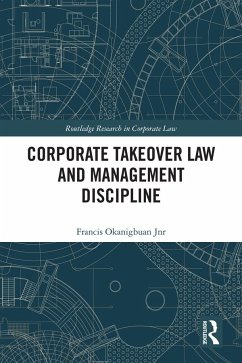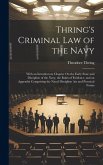Francis A Okanigbuan Jnr
Corporate Takeover Law and Management Discipline
Francis A Okanigbuan Jnr
Corporate Takeover Law and Management Discipline
- Gebundenes Buch
- Merkliste
- Auf die Merkliste
- Bewerten Bewerten
- Teilen
- Produkt teilen
- Produkterinnerung
- Produkterinnerung
This book examines the effectiveness of corporate takeovers.
Andere Kunden interessierten sich auch für
![Thring's Criminal Law of the Navy: With an Introductory Chapter On the Early State and Discipline of the Navy, the Rules of Evidence, and an Appendix Thring's Criminal Law of the Navy: With an Introductory Chapter On the Early State and Discipline of the Navy, the Rules of Evidence, and an Appendix]() Theodore ThringThring's Criminal Law of the Navy: With an Introductory Chapter On the Early State and Discipline of the Navy, the Rules of Evidence, and an Appendix44,99 €
Theodore ThringThring's Criminal Law of the Navy: With an Introductory Chapter On the Early State and Discipline of the Navy, the Rules of Evidence, and an Appendix44,99 €![The law Relating to Public Worship; With Especial Regard to Matters of Ritual and Ornamentation, and to the Means for Securing the due Observance Thereof; and Containing the Public Worship Regulation act, 1874, the Church Discipline act, the Statutes of U The law Relating to Public Worship; With Especial Regard to Matters of Ritual and Ornamentation, and to the Means for Securing the due Observance Thereof; and Containing the Public Worship Regulation act, 1874, the Church Discipline act, the Statutes of U]() Seward BriceThe law Relating to Public Worship; With Especial Regard to Matters of Ritual and Ornamentation, and to the Means for Securing the due Observance Thereof; and Containing the Public Worship Regulation act, 1874, the Church Discipline act, the Statutes of U48,99 €
Seward BriceThe law Relating to Public Worship; With Especial Regard to Matters of Ritual and Ornamentation, and to the Means for Securing the due Observance Thereof; and Containing the Public Worship Regulation act, 1874, the Church Discipline act, the Statutes of U48,99 €![Remarks On Prisons and Prison Discipline in the United States Remarks On Prisons and Prison Discipline in the United States]() Dorothea Lynde DixRemarks On Prisons and Prison Discipline in the United States34,99 €
Dorothea Lynde DixRemarks On Prisons and Prison Discipline in the United States34,99 €![A System of Penal Discipline A System of Penal Discipline]() Henry Phibbs FryA System of Penal Discipline36,99 €
Henry Phibbs FryA System of Penal Discipline36,99 €![A Collection of the Judgments of the Judicial Committee of the Privy Council in Ecclesiastical Cases Relating to Doctrine and Discipline A Collection of the Judgments of the Judicial Committee of the Privy Council in Ecclesiastical Cases Relating to Doctrine and Discipline]() William Henry FremantleA Collection of the Judgments of the Judicial Committee of the Privy Council in Ecclesiastical Cases Relating to Doctrine and Discipline43,99 €
William Henry FremantleA Collection of the Judgments of the Judicial Committee of the Privy Council in Ecclesiastical Cases Relating to Doctrine and Discipline43,99 €![The Market for Corporate Control in Japan The Market for Corporate Control in Japan]() Enrico ColceraThe Market for Corporate Control in Japan77,99 €
Enrico ColceraThe Market for Corporate Control in Japan77,99 €![Sustainable Fisheries Management and International Law Sustainable Fisheries Management and International Law]() Abdullah-Al ArifSustainable Fisheries Management and International Law198,99 €
Abdullah-Al ArifSustainable Fisheries Management and International Law198,99 €-
-
-
This book examines the effectiveness of corporate takeovers.
Hinweis: Dieser Artikel kann nur an eine deutsche Lieferadresse ausgeliefert werden.
Hinweis: Dieser Artikel kann nur an eine deutsche Lieferadresse ausgeliefert werden.
Produktdetails
- Produktdetails
- Verlag: Routledge
- Seitenzahl: 220
- Erscheinungstermin: 3. März 2020
- Englisch
- Abmessung: 240mm x 161mm x 17mm
- Gewicht: 499g
- ISBN-13: 9781138600027
- ISBN-10: 1138600024
- Artikelnr.: 59414990
- Herstellerkennzeichnung
- Libri GmbH
- Europaallee 1
- 36244 Bad Hersfeld
- gpsr@libri.de
- Verlag: Routledge
- Seitenzahl: 220
- Erscheinungstermin: 3. März 2020
- Englisch
- Abmessung: 240mm x 161mm x 17mm
- Gewicht: 499g
- ISBN-13: 9781138600027
- ISBN-10: 1138600024
- Artikelnr.: 59414990
- Herstellerkennzeichnung
- Libri GmbH
- Europaallee 1
- 36244 Bad Hersfeld
- gpsr@libri.de
Dr Francis Okanigbuan Jnr is a Lecturer in the School of Law, Liverpool John Moores University. He was a Post-doctoral Research Fellow on the Arts and Humanities Research Council funded project; 'Business Judgment and the Courts' in the Centre for Business Law and Practice, School of Law, University of Leeds. He was a Teaching Assistant at the University of Manchester and Tutor at the Manchester Metropolitan University. He is a graduate-member of the Institute of Chartered Secretaries and Administrators. His research interests include; takeovers (the market for corporate control), corporate law, corporate governance, law and economics of regulation and comparative law.
TABLE OF CONTENTS
Part I
CHAPTER ONE
GENERAL INTRODUCTION
Abstract
1.1 Introduction
1.2 The Persistent Challenges of Corporate Acquisition
1.3 Theoretical Perspectives of Takeovers
1.4 Aim and Scope
1.5 Outline
CHAPTER TWO
THE REGULATORY FRAMEWORK OF INSTITUTIONS
Abstract
2.1 Introduction
2.2 The Neo-classical Economics and the Old Institutional Economics
Theories
2.3 The Framework of the New Institutional Economics
2.4 Institutions: Levels of Development and Change
2.5 Main Streams in Economics of Institutions
2.5.1 Property Rights of Shareholders
2.5.2 Transaction Costs Economics (Costs of Takeovers)
2.5.3 Agency Relationship between Managements and shareholders
2.6 How Institutions Can Influence Market Discipline
2.7 Conclusion
CHAPTER THREE
THE THEORETICAL FRAMEWORK OF CORPORATE TAKEOVERS
Abstract
3.1 Introduction
3.2 Types of Corporate Takeover: Nature and Characteristics
3.3 The Takeover Devices
3.3.1 Direct Purchase of Shares (tender offer or open market bid)
3.3.2 Proxy Contests
3.4 The Takeover Hypotheses and Justification for Takeovers
3.4.1 The Disciplinary Hypothesis
3.4.2 The Synergy Hypothesis
3.4.3 The Hubris Hypothesis
3.5 Takeover Defences
3.6 Contractual Relationships: Agency Conflicts and Employment Issues
3.6.1 Agency conflicts
3.6.2 Employment Issues
3.6.3 The Contractual Theory of the Corporation
3.6.4 The Entity Theory of the Corporation
3.7 Conclusion
Part 11
CHAPTER FOUR
TAKEOVER REGULATION IN THE UNITED KINGDOM
Abstract
4.1 Introduction
4.2 The Historical Development of Takeover Regulation in the United Kingdom
4.3 Shareholder Protection
4.3.1 Shareholders of Target Companies
4.3.2 Shareholders of Acquiring Companies
(i) Are Shareholders of Acquiring Companies Protected from Opportunistic
Behaviour of Management?
(ii) Do Shareholders of Acquiring Companies Always Record Gains From
Takeovers?
(iii) Derivative Action and Personal Actions by Shareholders of Acquiring
Companies
4.4 Employment Protection
4.4.1 The Transfer of Undertakings (Protection of Employment) Regulations
(TUPE)
4.5 Conclusion
CHAPTER FIVE
THE REGULATORY FRAMEWORK FOR TAKEOVERS IN THE
UNITED STATES (DELAWARE)
Abstract
5.1 Introduction
5.2 The Historical Development of Takeover Regulation
5.3 Shareholders of Target Companies
5.3.1 The Williams Act of 1968
5.3.2. Target Shareholder Protection in Delaware
a) Unocal Corp v Mesa Petroleum Company
b. Revlon Inc v MacAndrews & Forbes Holdings Inc.
5.4 Shareholders of Acquiring Companies
5.4.1 Managerial Conflict of Interests
a) Market power
b) Competition among bidders
c) Managerial Hubris - Corporate Size
5.5 Costly Acquisitions and Employee Dismissal
5.6 Conclusion
CHAPTER SIX
MANAGEMENT BOARD: CORPORATE GOVERNANCE AND THE MARKET FOR CORPORATE CONTROL
Abstract
6.1 Introduction
6.2 Managements Boards and Corporate Governance Administration
6.2.1 Corporate Governance in the United Kingdom
6.2.2 Corporate Governance in the United States
6.3 The Role of Managers in Corporate Acquisitions
6.3.1 Managements of Target Companies
6.3.2 Managements of Acquiring Companies
6.4 Conclusion
Part 111
CHAPTER SEVEN
COMPLEMENTARY INTERESTS OF SHAREHOLDERS AND EMPLOYEES
7.1 Introduction
7.2 Limitations to Employment Protection in Takeovers
(a) Employees as Non-financial Stakeholders
(b) Shareholder Value Approach to Corporate Regulation
7.3 Default Beneficiaries of Corporate Acquisitions
7.3.1 Shareholders in Target Companies
7.3.2 Management Board
7.3.3 Creditors
7.4 Costs of Acquisitions and the Role of Managements
7.5 A New Paradigm for Employment Protection and Shareholder Interests
7.6 Conclusion
CHAPTER EIGHT
JUDICIAL INTERVENTION IN CORPORATE ACQUISITIONS
8.1 Introduction
8.2 Case Search Methodology
8.3 Shareholder Litigations in the United Kingdom
8.4 Judicial intervention in Delaware
8.4.1 Shareholder Application Denied
8.4.2 Successful Shareholder Application
8.5 Conclusion
CHAPTER NINE
A NEW PARADIGM FOR TAKEOVER ADMINISTRATION
Abstract
9.1 Introduction
9.2 The Dominant Role of Managements in Takeovers
9.3 Professionalising Managerial Decisions and Enhancing Market Functions
Part I
CHAPTER ONE
GENERAL INTRODUCTION
Abstract
1.1 Introduction
1.2 The Persistent Challenges of Corporate Acquisition
1.3 Theoretical Perspectives of Takeovers
1.4 Aim and Scope
1.5 Outline
CHAPTER TWO
THE REGULATORY FRAMEWORK OF INSTITUTIONS
Abstract
2.1 Introduction
2.2 The Neo-classical Economics and the Old Institutional Economics
Theories
2.3 The Framework of the New Institutional Economics
2.4 Institutions: Levels of Development and Change
2.5 Main Streams in Economics of Institutions
2.5.1 Property Rights of Shareholders
2.5.2 Transaction Costs Economics (Costs of Takeovers)
2.5.3 Agency Relationship between Managements and shareholders
2.6 How Institutions Can Influence Market Discipline
2.7 Conclusion
CHAPTER THREE
THE THEORETICAL FRAMEWORK OF CORPORATE TAKEOVERS
Abstract
3.1 Introduction
3.2 Types of Corporate Takeover: Nature and Characteristics
3.3 The Takeover Devices
3.3.1 Direct Purchase of Shares (tender offer or open market bid)
3.3.2 Proxy Contests
3.4 The Takeover Hypotheses and Justification for Takeovers
3.4.1 The Disciplinary Hypothesis
3.4.2 The Synergy Hypothesis
3.4.3 The Hubris Hypothesis
3.5 Takeover Defences
3.6 Contractual Relationships: Agency Conflicts and Employment Issues
3.6.1 Agency conflicts
3.6.2 Employment Issues
3.6.3 The Contractual Theory of the Corporation
3.6.4 The Entity Theory of the Corporation
3.7 Conclusion
Part 11
CHAPTER FOUR
TAKEOVER REGULATION IN THE UNITED KINGDOM
Abstract
4.1 Introduction
4.2 The Historical Development of Takeover Regulation in the United Kingdom
4.3 Shareholder Protection
4.3.1 Shareholders of Target Companies
4.3.2 Shareholders of Acquiring Companies
(i) Are Shareholders of Acquiring Companies Protected from Opportunistic
Behaviour of Management?
(ii) Do Shareholders of Acquiring Companies Always Record Gains From
Takeovers?
(iii) Derivative Action and Personal Actions by Shareholders of Acquiring
Companies
4.4 Employment Protection
4.4.1 The Transfer of Undertakings (Protection of Employment) Regulations
(TUPE)
4.5 Conclusion
CHAPTER FIVE
THE REGULATORY FRAMEWORK FOR TAKEOVERS IN THE
UNITED STATES (DELAWARE)
Abstract
5.1 Introduction
5.2 The Historical Development of Takeover Regulation
5.3 Shareholders of Target Companies
5.3.1 The Williams Act of 1968
5.3.2. Target Shareholder Protection in Delaware
a) Unocal Corp v Mesa Petroleum Company
b. Revlon Inc v MacAndrews & Forbes Holdings Inc.
5.4 Shareholders of Acquiring Companies
5.4.1 Managerial Conflict of Interests
a) Market power
b) Competition among bidders
c) Managerial Hubris - Corporate Size
5.5 Costly Acquisitions and Employee Dismissal
5.6 Conclusion
CHAPTER SIX
MANAGEMENT BOARD: CORPORATE GOVERNANCE AND THE MARKET FOR CORPORATE CONTROL
Abstract
6.1 Introduction
6.2 Managements Boards and Corporate Governance Administration
6.2.1 Corporate Governance in the United Kingdom
6.2.2 Corporate Governance in the United States
6.3 The Role of Managers in Corporate Acquisitions
6.3.1 Managements of Target Companies
6.3.2 Managements of Acquiring Companies
6.4 Conclusion
Part 111
CHAPTER SEVEN
COMPLEMENTARY INTERESTS OF SHAREHOLDERS AND EMPLOYEES
7.1 Introduction
7.2 Limitations to Employment Protection in Takeovers
(a) Employees as Non-financial Stakeholders
(b) Shareholder Value Approach to Corporate Regulation
7.3 Default Beneficiaries of Corporate Acquisitions
7.3.1 Shareholders in Target Companies
7.3.2 Management Board
7.3.3 Creditors
7.4 Costs of Acquisitions and the Role of Managements
7.5 A New Paradigm for Employment Protection and Shareholder Interests
7.6 Conclusion
CHAPTER EIGHT
JUDICIAL INTERVENTION IN CORPORATE ACQUISITIONS
8.1 Introduction
8.2 Case Search Methodology
8.3 Shareholder Litigations in the United Kingdom
8.4 Judicial intervention in Delaware
8.4.1 Shareholder Application Denied
8.4.2 Successful Shareholder Application
8.5 Conclusion
CHAPTER NINE
A NEW PARADIGM FOR TAKEOVER ADMINISTRATION
Abstract
9.1 Introduction
9.2 The Dominant Role of Managements in Takeovers
9.3 Professionalising Managerial Decisions and Enhancing Market Functions
TABLE OF CONTENTS
Part I
CHAPTER ONE
GENERAL INTRODUCTION
Abstract
1.1 Introduction
1.2 The Persistent Challenges of Corporate Acquisition
1.3 Theoretical Perspectives of Takeovers
1.4 Aim and Scope
1.5 Outline
CHAPTER TWO
THE REGULATORY FRAMEWORK OF INSTITUTIONS
Abstract
2.1 Introduction
2.2 The Neo-classical Economics and the Old Institutional Economics
Theories
2.3 The Framework of the New Institutional Economics
2.4 Institutions: Levels of Development and Change
2.5 Main Streams in Economics of Institutions
2.5.1 Property Rights of Shareholders
2.5.2 Transaction Costs Economics (Costs of Takeovers)
2.5.3 Agency Relationship between Managements and shareholders
2.6 How Institutions Can Influence Market Discipline
2.7 Conclusion
CHAPTER THREE
THE THEORETICAL FRAMEWORK OF CORPORATE TAKEOVERS
Abstract
3.1 Introduction
3.2 Types of Corporate Takeover: Nature and Characteristics
3.3 The Takeover Devices
3.3.1 Direct Purchase of Shares (tender offer or open market bid)
3.3.2 Proxy Contests
3.4 The Takeover Hypotheses and Justification for Takeovers
3.4.1 The Disciplinary Hypothesis
3.4.2 The Synergy Hypothesis
3.4.3 The Hubris Hypothesis
3.5 Takeover Defences
3.6 Contractual Relationships: Agency Conflicts and Employment Issues
3.6.1 Agency conflicts
3.6.2 Employment Issues
3.6.3 The Contractual Theory of the Corporation
3.6.4 The Entity Theory of the Corporation
3.7 Conclusion
Part 11
CHAPTER FOUR
TAKEOVER REGULATION IN THE UNITED KINGDOM
Abstract
4.1 Introduction
4.2 The Historical Development of Takeover Regulation in the United Kingdom
4.3 Shareholder Protection
4.3.1 Shareholders of Target Companies
4.3.2 Shareholders of Acquiring Companies
(i) Are Shareholders of Acquiring Companies Protected from Opportunistic
Behaviour of Management?
(ii) Do Shareholders of Acquiring Companies Always Record Gains From
Takeovers?
(iii) Derivative Action and Personal Actions by Shareholders of Acquiring
Companies
4.4 Employment Protection
4.4.1 The Transfer of Undertakings (Protection of Employment) Regulations
(TUPE)
4.5 Conclusion
CHAPTER FIVE
THE REGULATORY FRAMEWORK FOR TAKEOVERS IN THE
UNITED STATES (DELAWARE)
Abstract
5.1 Introduction
5.2 The Historical Development of Takeover Regulation
5.3 Shareholders of Target Companies
5.3.1 The Williams Act of 1968
5.3.2. Target Shareholder Protection in Delaware
a) Unocal Corp v Mesa Petroleum Company
b. Revlon Inc v MacAndrews & Forbes Holdings Inc.
5.4 Shareholders of Acquiring Companies
5.4.1 Managerial Conflict of Interests
a) Market power
b) Competition among bidders
c) Managerial Hubris - Corporate Size
5.5 Costly Acquisitions and Employee Dismissal
5.6 Conclusion
CHAPTER SIX
MANAGEMENT BOARD: CORPORATE GOVERNANCE AND THE MARKET FOR CORPORATE CONTROL
Abstract
6.1 Introduction
6.2 Managements Boards and Corporate Governance Administration
6.2.1 Corporate Governance in the United Kingdom
6.2.2 Corporate Governance in the United States
6.3 The Role of Managers in Corporate Acquisitions
6.3.1 Managements of Target Companies
6.3.2 Managements of Acquiring Companies
6.4 Conclusion
Part 111
CHAPTER SEVEN
COMPLEMENTARY INTERESTS OF SHAREHOLDERS AND EMPLOYEES
7.1 Introduction
7.2 Limitations to Employment Protection in Takeovers
(a) Employees as Non-financial Stakeholders
(b) Shareholder Value Approach to Corporate Regulation
7.3 Default Beneficiaries of Corporate Acquisitions
7.3.1 Shareholders in Target Companies
7.3.2 Management Board
7.3.3 Creditors
7.4 Costs of Acquisitions and the Role of Managements
7.5 A New Paradigm for Employment Protection and Shareholder Interests
7.6 Conclusion
CHAPTER EIGHT
JUDICIAL INTERVENTION IN CORPORATE ACQUISITIONS
8.1 Introduction
8.2 Case Search Methodology
8.3 Shareholder Litigations in the United Kingdom
8.4 Judicial intervention in Delaware
8.4.1 Shareholder Application Denied
8.4.2 Successful Shareholder Application
8.5 Conclusion
CHAPTER NINE
A NEW PARADIGM FOR TAKEOVER ADMINISTRATION
Abstract
9.1 Introduction
9.2 The Dominant Role of Managements in Takeovers
9.3 Professionalising Managerial Decisions and Enhancing Market Functions
Part I
CHAPTER ONE
GENERAL INTRODUCTION
Abstract
1.1 Introduction
1.2 The Persistent Challenges of Corporate Acquisition
1.3 Theoretical Perspectives of Takeovers
1.4 Aim and Scope
1.5 Outline
CHAPTER TWO
THE REGULATORY FRAMEWORK OF INSTITUTIONS
Abstract
2.1 Introduction
2.2 The Neo-classical Economics and the Old Institutional Economics
Theories
2.3 The Framework of the New Institutional Economics
2.4 Institutions: Levels of Development and Change
2.5 Main Streams in Economics of Institutions
2.5.1 Property Rights of Shareholders
2.5.2 Transaction Costs Economics (Costs of Takeovers)
2.5.3 Agency Relationship between Managements and shareholders
2.6 How Institutions Can Influence Market Discipline
2.7 Conclusion
CHAPTER THREE
THE THEORETICAL FRAMEWORK OF CORPORATE TAKEOVERS
Abstract
3.1 Introduction
3.2 Types of Corporate Takeover: Nature and Characteristics
3.3 The Takeover Devices
3.3.1 Direct Purchase of Shares (tender offer or open market bid)
3.3.2 Proxy Contests
3.4 The Takeover Hypotheses and Justification for Takeovers
3.4.1 The Disciplinary Hypothesis
3.4.2 The Synergy Hypothesis
3.4.3 The Hubris Hypothesis
3.5 Takeover Defences
3.6 Contractual Relationships: Agency Conflicts and Employment Issues
3.6.1 Agency conflicts
3.6.2 Employment Issues
3.6.3 The Contractual Theory of the Corporation
3.6.4 The Entity Theory of the Corporation
3.7 Conclusion
Part 11
CHAPTER FOUR
TAKEOVER REGULATION IN THE UNITED KINGDOM
Abstract
4.1 Introduction
4.2 The Historical Development of Takeover Regulation in the United Kingdom
4.3 Shareholder Protection
4.3.1 Shareholders of Target Companies
4.3.2 Shareholders of Acquiring Companies
(i) Are Shareholders of Acquiring Companies Protected from Opportunistic
Behaviour of Management?
(ii) Do Shareholders of Acquiring Companies Always Record Gains From
Takeovers?
(iii) Derivative Action and Personal Actions by Shareholders of Acquiring
Companies
4.4 Employment Protection
4.4.1 The Transfer of Undertakings (Protection of Employment) Regulations
(TUPE)
4.5 Conclusion
CHAPTER FIVE
THE REGULATORY FRAMEWORK FOR TAKEOVERS IN THE
UNITED STATES (DELAWARE)
Abstract
5.1 Introduction
5.2 The Historical Development of Takeover Regulation
5.3 Shareholders of Target Companies
5.3.1 The Williams Act of 1968
5.3.2. Target Shareholder Protection in Delaware
a) Unocal Corp v Mesa Petroleum Company
b. Revlon Inc v MacAndrews & Forbes Holdings Inc.
5.4 Shareholders of Acquiring Companies
5.4.1 Managerial Conflict of Interests
a) Market power
b) Competition among bidders
c) Managerial Hubris - Corporate Size
5.5 Costly Acquisitions and Employee Dismissal
5.6 Conclusion
CHAPTER SIX
MANAGEMENT BOARD: CORPORATE GOVERNANCE AND THE MARKET FOR CORPORATE CONTROL
Abstract
6.1 Introduction
6.2 Managements Boards and Corporate Governance Administration
6.2.1 Corporate Governance in the United Kingdom
6.2.2 Corporate Governance in the United States
6.3 The Role of Managers in Corporate Acquisitions
6.3.1 Managements of Target Companies
6.3.2 Managements of Acquiring Companies
6.4 Conclusion
Part 111
CHAPTER SEVEN
COMPLEMENTARY INTERESTS OF SHAREHOLDERS AND EMPLOYEES
7.1 Introduction
7.2 Limitations to Employment Protection in Takeovers
(a) Employees as Non-financial Stakeholders
(b) Shareholder Value Approach to Corporate Regulation
7.3 Default Beneficiaries of Corporate Acquisitions
7.3.1 Shareholders in Target Companies
7.3.2 Management Board
7.3.3 Creditors
7.4 Costs of Acquisitions and the Role of Managements
7.5 A New Paradigm for Employment Protection and Shareholder Interests
7.6 Conclusion
CHAPTER EIGHT
JUDICIAL INTERVENTION IN CORPORATE ACQUISITIONS
8.1 Introduction
8.2 Case Search Methodology
8.3 Shareholder Litigations in the United Kingdom
8.4 Judicial intervention in Delaware
8.4.1 Shareholder Application Denied
8.4.2 Successful Shareholder Application
8.5 Conclusion
CHAPTER NINE
A NEW PARADIGM FOR TAKEOVER ADMINISTRATION
Abstract
9.1 Introduction
9.2 The Dominant Role of Managements in Takeovers
9.3 Professionalising Managerial Decisions and Enhancing Market Functions








